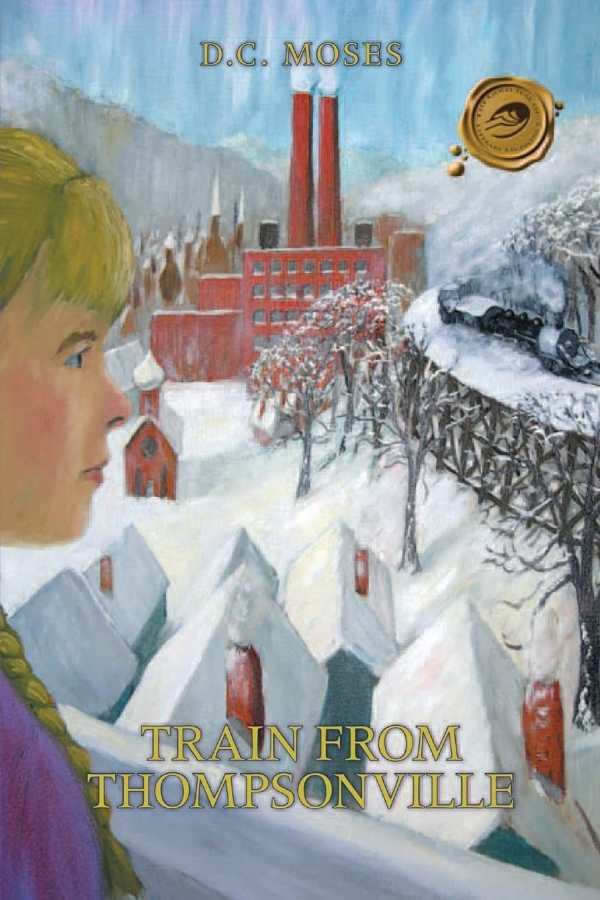It looks like you've stumbled upon a page meant to be read by our code instead of viewed directly. You're probably looking for this page.
Train from Thompsonville
Train from Thompsonville is a nostalgic historical novel in which a girl grows up in a vibrant factory town.
In D. C. Moses’s historical novel Train from Thompsonville a Polish Catholic girl comes of age in a New York factory town.
When the novel begins in 1940, Joanna is an amiable and introspective fifth grader. Her home, Thompsonville, is dominated by a shoe factory wherein Polish and Slovakian immigrants rank below other workers. As her parents work to rise beyond their circumstances, Joanna is left to wonder her way through her common days. She gets into shenanigans at parochial school, where there are punishments; she gets in neighborhood snow fights. She faces whooping cough, meets for family gatherings, and overhears other people’s conversations. She’s passionate about the movies, too, which spark imaginative play for her.
Joanna is an earnest witness to the period that she’s living in. She talks about the town as it changes through the seasons, but also expresses growing curiosity about what’s beyond its boundaries. Still, she has affection for her home. She covers the furnishings and layout of her house, traditional Polish foods, and the stories told to her by her elders. The women in Joanna’s family stand out from the rest of the cast: they are efficient and resolute.
But despite her father’s distress over their family’s circumstances, Joanna herself has limited understanding of what they face. Such conflicts are in the novel’s background; Joanna’s more innocent perspective reigns. She is quick in her coverage of events like the attack on her Pearl Harbor, and also races through changes in her family; she’s excited as she transfers to junior high. In her adolescence, she considers boys, absorbs more of her family’s problems, and experiences some loss of innocence after a tragedy befalls a friend’s family.
The story is most about Joanna’s gradual maturation, and its recording of her experiences is steady. Still, while there’s realism and charm in some scenes from Joanna’s youth, as of a school dance that’s marked by awkwardness and the hopes of the teenagers in attendance, the book is slower when it devotes space to Joanna’s attentive observations of more ordinary goings-on, like classroom activities and Catholic services. Many of its corresponding passages are dense and tedious.
When the novel broadens to consider adult issues around labor and post-war real estate development, it loses more of its sense of focus. This is furthered by digressions that cover Joanna’s mother’s secretarial employment, which are distracting. Near its end, the book rushes to cover Joanna’s first love, high school events, and eventual graduation; its finale is open-ended and wistful.
Variously humorous and nostalgic, Train from Thompsonville is a lingering historical novel in which a girl grows up in a vibrant factory town.
Reviewed by
Karen Rigby
Disclosure: This article is not an endorsement, but a review. The publisher of this book provided free copies of the book and paid a small fee to have their book reviewed by a professional reviewer. Foreword Reviews and Clarion Reviews make no guarantee that the publisher will receive a positive review. Foreword Magazine, Inc. is disclosing this in accordance with the Federal Trade Commission’s 16 CFR, Part 255.
